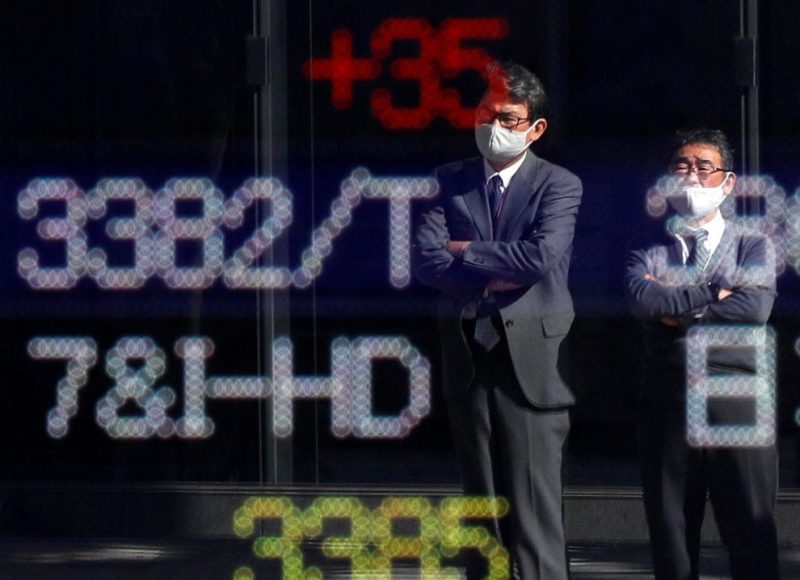Asian markets slumped on Wednesday following a Wall Street plunge after dire consumer confidence data dampened investor optimism and fuelled worries of a recession.
Currencies and stocks across the region fell, as weak economic data from the United States overshadowed the easing of some Covid-19 restrictions in China.
Japan’s Nikkei snapped a four-day rally after the Wall Street slump, the Hang Seng suffered with tech firms leading the retreat and there were falls in Seoul, Bangkok and Manila.
MARKET INSIGHTS: China Stock Market Guide: Everything You Need To Know
Tokyo was dragged down by its heavyweight technology stocks and the Nikkei share average ended 0.91% lower at 26,804.60. The broader Topix lost 0.72% to 1,893.57.
“Today’s market decline is solely due to Wall Street’s loss, which was driven by concerns over consumption,” said Shuji Hosoi, a senior strategist at Daiwa Securities.
Tokyo Electric Power Holdings, though, jumped 5.27% and was the top gainer on the Nikkei, after Japanese Prime Minister Fumio Kishida said the nation would make the greatest possible use of nuclear power and secure enough power supply.
His remark came as Tokyo’s heat broke nearly 150-year-old records for June and authorities warned power supply remained tight enough to raise the spectre of cuts.
The utility sector advanced 1.01% and was the top gainer among the Tokyo Stock Exchange’s 33 industry sub-indexes.
China Eases Covid Restrictions
While parts of the Chinese stock market, including property, extended gains, the positive impact of the news about the easing of some Covid restrictions largely petered out.
Chinese blue-chips, which hit four-month highs on Tuesday, slumped 1.5% and the Hang Seng Index dropped 1.88%, or 422.08 points, to 21,996.89. The Hang Seng tech index fell 3.3% after touching a near four-month high in the previous session.
The Shanghai Composite Index dipped 1.40%, or 47.69 points, to 3,361.52, while the Shenzhen Composite Index on China’s second exchange dropped 2.20%, or 49.41 points, to 2,194.51.
South Korea’s consumer confidence has also dipped, pulling the country’s main stock index 1.8% lower, while the won tumbled 1.2%. Stocks in Thailand and the Philippines shed 0.5% and 0.7% respectively.
Indian stocks also fell with Mumbai’s signature Nifty 50 index down 0.25%, or 39.00 points, at 15,811.20.
US Consumer Confidence Drops
Globally, stock markets slipped for the second straight day and bond yields inched lower on growing fears that policymakers bent on dampening inflation will tip their economies into recession.
Data on Tuesday showed US consumer confidence dropped to a 16-month low in June, yet several Fed policymakers pledged further rapid interest-rate hikes, citing the need to tame “unbridled” inflation.
Those US figures, following a raft of dismal consumer confidence data across Europe, triggered steep Wall Street falls, sending the S&P 500 and the Nasdaq indexes down 2% and 3% respectively.
Inflation fears have been fanned further by three straight days of oil price gains that have taken Brent crude futures above $117 a barrel.
“The market is stuck in the push-pull between the current deteriorating macro backdrop and the looming threat of a recession, pitted against the strongest fundamental oil market set-up in decades, maybe ever,” RBC Capital’s Mike Tran told clients.
Market jitters are driving a renewed bid for the dollar, lifting it to a one-week high against a basket of currencies.
Key figures
Tokyo – Nikkei 225 < DOWN 0.91% at 26,804.60 (close)
Hong Kong – Hang Seng Index < DOWN 1.88% at 21,996.89 (close)
Shanghai – Composite < DOWN 1.40% at 3,361.52 (close)
New York – Dow < DOWN 1.56% at 30,946.99 (Tuesday close)
- Reuters with additional editing by Sean O’Meara
Read more:
US Says Five Chinese Companies Support Russia’s Military
China Faces Economic Hit From Extreme Weather in July, August
Vanke Chairman Says China Real Estate Has Bottomed Out
























